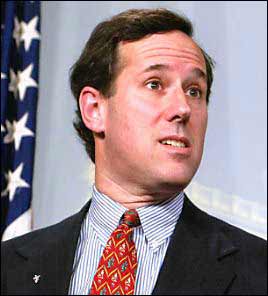 Every time Rick Santorum speaks, a secular democrat gets his wings.
Every time Rick Santorum speaks, a secular democrat gets his wings.
Yes, I know there are three other GOP candidates in the race, but as a theological writer also interested in politics, there is none more fascinating than Santorum.
A lifelong Catholic, the senator has only come into his theocratic, social conservative voice in recent years. His parents raised their kids in the church, but they also were big fans of John F Kennedy. They even kept a picture of the first-ever Catholic president hanging on the wall. Santorum obviously drifted right of most positions JFK would have advocated, though earlier on, it was not as evident as today.
In his earlier political days, Santorum actually avoided hot-button issues like abortion, gay marriage and birth control, opting instead for the mantas of small government and state autonomy. It wasn’t until his priest urged him to prayerfully consider imbuing his political life more thoroughly with the teachings of his faith that he experienced what most protestant Christians would call a “born again” moment.
After that, he began speaking out about the polarizing social issues you hear in his stump speeches today. He’s claimed that birth control goes against God’s plan for creation. He believes our nation is firmly in the grip of Satan. He think that women’s roles in areas such as the military should be scaled back. He feels that same-sex marriage rights present an attack on the divinely ordained institution of marriage, and he has argued that there is a secular attack, bent on driving faith out of the public square.
I have written pieces previously both about the dynamics of fear and anger, and also of nostalgia in the GOP rhetoric. Santorum is the embodiment of all of these traits on this season’s campaign trail. But the effect of his approach is something that many on the left, particularly those who appreciate a fortified wall of separation between church and state, should celebrate.
For starters, the majority of Americans agree that there should be limits on the influence of faith in the political forum. But what Santorum has done is take a historic debate about Jeffersonian democracy and turned it into the fuel for rhetoric about a culture war. Forces of godlessness want to snatch your faith from you, burying it deep in the recesses of American life. Though this is not at all the case for Jeffersonian church-an-state advocates, the effect of his words is to paint an unappealing picture for a majority of Americans of what faith in political life looks like.
So while Senator Santorum may galvanize a minority base for himself, the net result will be broader push-back against the influence of faith in politics, particularly if his brand of it is what people expect from the rest of Christian leadership.
Second, Santorum has succeeded in co-opting the entire republican platform of talking points for weeks, if not months. The GOP and their presumptive nominee, Mitt Romney, knew that their fate hung on their ability to frame the debate in economic terms. Never mind if the current economic crisis has its roots in at least two presidents before this one; the economy is anemic and Americans want that to change. Whoever they believe can best deliver on that promise is likely to get the moderate vote.
But Santorum would rather talk about birth control, abortion and gay marriage. Aside from this serving as a distraction from the strategy the GOP would need to try and win, it also has caused Romney to shift even further right, away from his previously more moderate positions on social matters.
Had the GOP been able to present a candidate with strong business experience and a moderate social record to pit against Obama, the election would have largely swung based on the state of the economy at the time. But instead, Romney (once he finally wins the nomination, because he will win) either will have to reverse his current positions that he adopted to woo the conservative base, or he’ll have to embrace a social platform that polls show a majority of Americans simply cannot stomach.
Every day that Santorum remains in the race represents a victory both for progressives and secularists. Perhaps their surest strategy for a win come November is to find a way to keep Santorum talking all the way up to election day.











